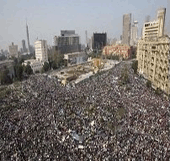Egypt: Two years of January 25 revolution
Published on Thu, 2013-03-07 23:15
Almost two years have passed since human rights and feminists organizations expressed their deep concern at the escalation of policies that reinforce impunity, do not protect citizens and do not guarantee the right of peaceful assembly. The exclusion of women from the public sphere through direct incitement and aggression must be condemned. The heinous crimes of sexual violence can not be separated from the decline of the social status of women. The revolution of January 25, as the Egyptians call it, is the fourth in the last hundred and thirty years. The modern national movement has sought an effective national sovereignty, particularly with regard to economy and the ability to ensure socio-economic justice in the distribution of wealth and income. The Egyptian people discovered that without internal democracy it is impossible to preserve the conquests from previous revolutions. January 25 revolution asserts, then, the centrality of democracy, not only as a utopian goal, which practical implementation would be deferred indefinitely, but to lay the foundations of a modern, independent and prosperous country. The general goals of the revolution faced challenges with the contemporary regime, as core rights were jeopardized, starting off with child rights, a lot of violations were witnessed especially recently with the ongoing protests demanding the regime to commit to the revolution's principles. In its latest report, the Egyptian Coalition for Child’s Rights (ECCR) stated that in the clashes (26-27 January 2013) following the second anniversary of the January 25 revolution, 91 children less than 18 years of age were detained by Cairo police in inhumane conditions. "The statement denounced the use of children in clashes, and the state and society’s failure to offer them basic rights of protection. Many children were interrogated by the police without the presence of a lawyer or adult relatives before they were released."(2.1) According to the law they should have been interrogated within 24 hours of their arrest, but all children were detained for four days before seeing a prosecutor. "The statement also explained that the children were interrogated by a general prosecution and not a child’s prosecution which violates the rights put out in article 122 of the Egyptian Child’s Law".(2.2) Egypt's human rights threatened under current constitution fiasco. A drafted Egyptian constitution heavily influenced by Islamist conservatives contains articles that could pose a serious threat to basic human rights in post-Mubarak Egypt. The constitution fails to meet that standard because of vague language or limitations that destroy the essence of many rights."While the draft upholds some civil, political, social and economic rights, other key provisions are inconsistent with international human rights standards and would pose a serious threat to the future of human rights in Egypt" (3.1). Article 5 of the draft failed to ban torture, Article 36 threatened equality between men and women, while Article 9 "would amount to a serious threat to freedom of speech and religion. The failure to fully prohibit torture is especially surprising given the fact that anger against police abuse played a central role in the January 2011 uprising" (3.2). Human Rights groups accuse Morsi regime’s of far greater abuse of human rights than that of Mubarak’s. A statement prepared by 21 human rights organizations urged President Mohamed Morsi to put an end to the rapid deterioration of human rights in Egypt. [“The human rights record over the past eight months since President Mohamed Morsi took the seat of power… are worse than it was before the revolution in the era of the former president,” the joint-statement warned] (4). There is plenty of evidence which incriminates the Muslim Brotherhood and the police in the kidnapping of protesters. Morsi’s government seems to be trying to use violence against demonstrators as a weapon to settle things down until the upcoming elections. The kidnapping of activists and protesters are a tool to settle the community until they can secure the elections. Along the course of time and almost two years after that instant, Feminist and human rights organizations express deep concern due to the escalation of state policies that reinforce the state of impunity and which refrain from protecting citizens and securing peaceful assembly. The perpetuation of the approach of groups that support the regime in targeting female activists and excluding women from the public sphere through direct incitement and aggression must be condemned. Such atrocious crimes of sexual violence cannot be separated from women’s declining social status. There must public accountability for such crimes as women should not be out casted or tooled for political or tactical considerations. Source: Social Watch National Report 2013, Egypt |


